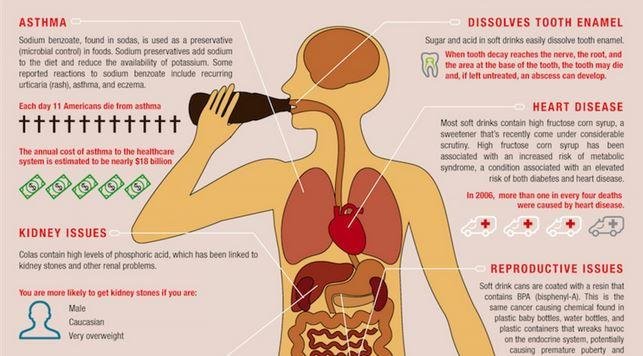Soft drinks, those effervescent elixirs of sweetness, have become ubiquitous in our modern lives. From cola to lemon-lime sodas, energy drinks to fruit-flavored concoctions, they tantalize our taste buds and quench our thirst. Yet, beneath their fizzy allure lies a dark side — a cascade of health risks that can harm our bodies in ways we often overlook. Let’s delve into the perils of soft drinks and explore why they deserve a second thought.

The Sugar Surge: A Weighty Issue
- The Sweetness Trap: Soft drinks are sugar bombs. A typical 20-ounce cola contains a whopping 65 grams of sugar, equivalent to five glazed doughnuts. When you consume sugary beverages, your blood glucose levels skyrocket, prompting your body to convert the excess sugar into fat. This rapid sugar surge doesn’t trigger satiety signals, leaving you hungry and prone to overeating.
- Weight Gain and Obesity: Studies consistently link sugary drinks to weight gain. People who regularly consume sugar-sweetened beverages tend to pack on extra pounds. In children, each daily serving of these drinks increases the risk of obesity by 60%.
The Liver’s Dilemma: Fatty Liver Disease
- Fructose Overload: Soft drinks contain high-fructose corn syrup, which floods your liver with fructose. Unlike glucose, which every cell can metabolize, fructose can only be processed by the liver. Excessive fructose intake leads to fat accumulation in the liver, contributing to nonalcoholic fatty liver disease.
- Cholesterol Chaos: Soft drinks also elevate bad cholesterol levels, further burdening your liver.
Kidney Conundrum: Stones and Disturbances
- Phosphoric Acid Peril: The phosphoric acid in carbonated drinks contributes to kidney stone formation and other renal disorders. Drinking just two glasses of fizzy beverages may double your risk of kidney disease.
Heartache in a Can: Cardiovascular Risks
- Added Sugar and Heart Disease: The link between added sugar and heart problems is well-established. Patients with heart disease who habitually consume sugary drinks face increased risks. Moreover, soft drink consumption often crowds out vegetable intake, disrupting lipid balance and accelerating heart issues.
- Visceral Fat Accumulation: Soft drinks, especially fructose-laden ones, contribute to visceral fat — the dangerous fat around your belly and organs. This fat is associated with heart disease and metabolic disturbances.
The Cancer Connection: Chemical Culprits
- Caramel Color Controversy: Some soft drinks contain 4-methylimidazole, a cancer-causing agent found in brown food coloring. The plastic and aluminum packaging materials may also introduce harmful chemicals.
- Pancreatic, Prostate, and Breast Cancer: The excessive sugar, colorants, and preservatives in soft drinks may increase the risk of various cancers.
Pregnancy Pitfalls: Premature Birth and Fetal Harm
- Artificial Sweeteners and Womb Environment: Soft drinks can alter the womb environment, potentially leading to premature birth. Caffeine in these drinks restricts blood flow to the placenta, affecting fetal growth.
Dental Demise: Acid Erosion and Tooth Decay
- Sugar and Enamel: Soft drinks, with their sugar and acidity, weaken tooth enamel. The acid produced during bacterial interaction can lead to cavities and dental decay.
Brain Fog and Aggression: Mental Health Impact
- Added Sugar and Brain Health: Sugary diets, including soft drinks, are linked to memory loss and may contribute to Alzheimer’s disease.
- Teenage Tumult: Soft drink consumption correlates with aggression and hostility in teenagers, potentially influencing alcohol and tobacco use.
Sleep Sabotage: Caffeine’s Dark Side
- Caffeine Addiction: Soft drinks, rich in caffeine, can disrupt sleep patterns, leading to insomnia and other sleep disorders.
Beyond the Bubbles: Other Health Hazards
- Asthma, Early Puberty, and More: Soft drinks are implicated in asthma, early puberty, premature aging, and osteoporosis.
- Diet Soft Drinks Aren’t Safe: Artificial sweeteners like aspartame and sorbitol, found in diet sodas, have their own links to cancer development and bowel syndrome.
In conclusion, soft drinks may quench your thirst momentarily, but their long-term effects on health are far from refreshing. It’s time to rethink our soda habits and opt for healthier alternatives like water, herbal teas, and freshly squeezed juices. Remember, moderation is key, and our bodies deserve better than a sugary fizz.
